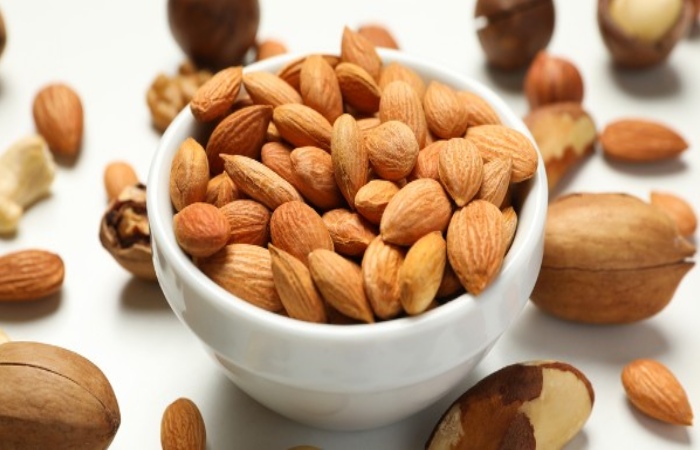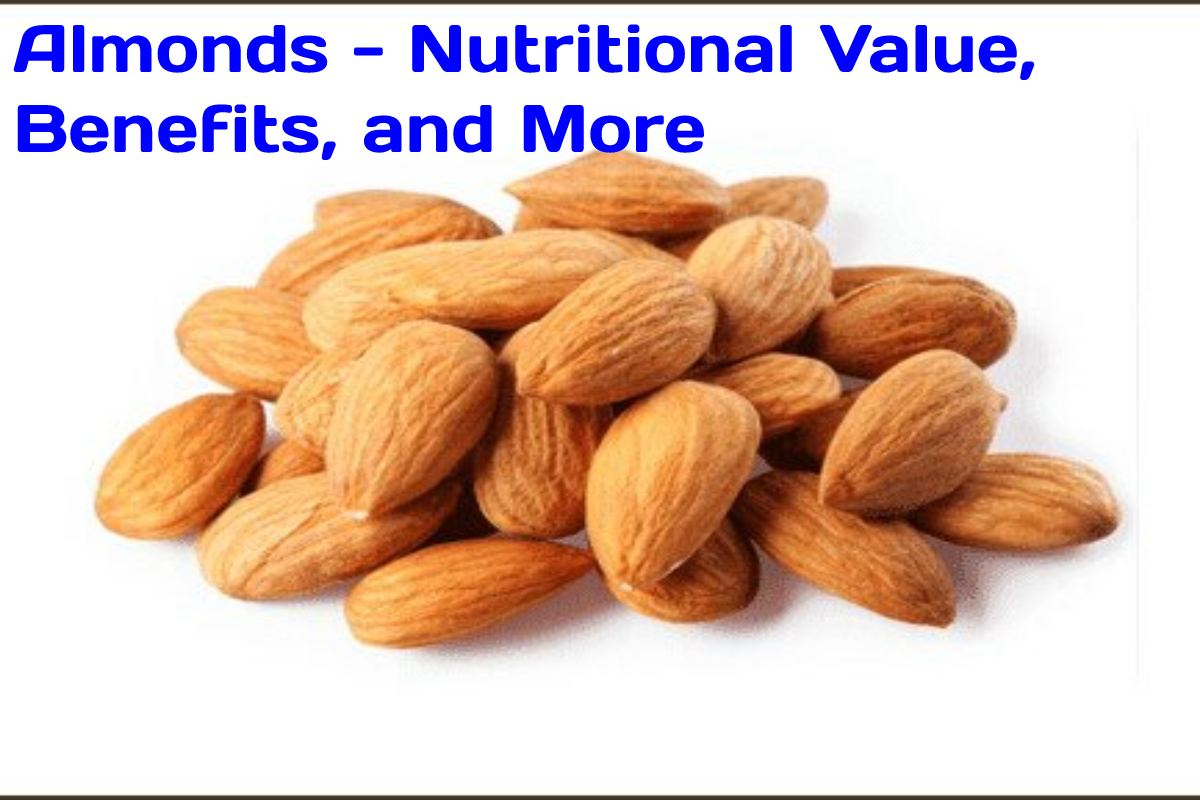Table of Contents
Almonds
Almonds are a good choice with many popular weight loss plans because they provide energising plant-based protein, fibre, and healthy fats to help keep you satisfied between meals.

Nutritional Value of Almonds
How many almonds can I take a day? It is considered that a serving of almonds should be about 28 grams. By taking a serving of almonds, you get:
- Calories: 164 calories (674 kJ)
- Carbohydrates: 6.1 g
- Fats: 13.8 g (monounsaturated 8.6 g/polyunsaturated 3.4 g)
- Vitamin E: 3 mg
- Vitamin B2: 0.3 mg
- Colina: 14,6 mg
- Calcium: 73.9 mg
- Magnesium: 75 mg
- Potassium: 197 mg
- Phosphorus: 136 mg
Benefits of Almonds
What are almonds good for? The almond is a food rich in protein and healthy fats and a valuable source of essential nutrients for a healthy and balanced diet. Its consumption is very suitable, especially in these cases:
1. Good For Pregnant Women
Its richness in proteins and minerals –such as calcium and magnesium– make it especially beneficial during gestation and pregnancy.
The almond is also a stimulating of breast milk (galactogenic).
2. Alternative To Dairy
Almonds are so rich in calcium that they are an excellent alternative to dairy products to ensure that you obtain the calcium, magnesium, and phosphorus necessary for forming and regenerating bones and teeth.
Its contribution to calcium makes it essential in the diet of the elderly, as it helps prevent bone fragility and osteoporosis.
3. Invigorating For Young People And Athletes
It is a refreshing and invigorating food because it is a good source of protein, especially for children, adolescents, and
Its richness in unsaturated fatty acids and phosphorus makes it beneficial for enhancing academic performance and feeding the brain. It helps prevent low academic performance, memory loss, and sudden mood swings.
4. Cardiosaludable
The unsaturated fats in almonds are a true balm for the heart, especially their monounsaturated fatty acids, which are the most abundant in their composition.
This healthy proportion of its fats, similar to that of olive oil, has the virtue of lowering “bad” LDL cholesterol and favouring the increase of HDL cholesterol, which helps prevent cardiovascular accidents.
In a trial in which volunteers completed to consume about 42 grams of almonds a day after three months start that most had had a significant reduction in the stages of C-reactive protein in the blood, an indicator of inflammation that, when elevated, is associated with an increased risk of heart disease.
On the other hand, flavonoids such as quercetin, catechins, and rutinosides contribute to the excellent state of the circulatory system.
5. Immune Booster
Almonds also support the immune system thanks to antioxidants such as vitamin E, quercetin, manganese, and zinc.
The almond in the kitchen
Raw, toasted, whole, filleted, or ground is excellent resource for preparing healthy recipes. And it is that this dried fruit stands out for its delicate flavour, buttery texture, and culinary versatility.
The almond, omnipresent at Christmas parties in the form of nougat, can also be found in the dressing of a vegetable dish and countless appetisers.
The most common is sweet recipes, such as the classic Santiago cake, the classic Catalan Tarquinius, or Middle Eastern and North African cuisine pastries.
Good Combinations
It goes well with green leaves, such as watercress or lamb’s lettuce, and makes good crumbs with the intense flavor of arugula and green olives. These qualities and how well it goes with soft cheeses make it ideal for creating salads.
It is a good pairing with garlic, and it is surprising, and the recipe that best takes advantage of this peculiarity is ajoblanco. This famous cold soup prepares with garlic, crushed almonds, bread, and olive oil.
Almond Flour
Almond flour is extraordinary for thickening a broth that is too liquid, facilitating the emulsification of a sauce or making croquettes.
It can prepare at home after removing the dark skin and helps prepare croquettes when leafy vegetables such as spinach are use.
The fine grind is best suited for pastry preparations such as marzipan.
Remaining some texture in stuffed, battered, or croquette dough is advisable.
Vegan Almond Bechamel
Its milk, in addition to allowing you to make flans and sweet creams, is ideal for preparing vegan bechamel sauces, in which butter replace by olive oil.
To make it, about 70 grams of almonds per liter of water are use, following these steps:
- They are mince, without skins, and crushed until they are slightly ground.
- Add half of the water and grind again.
- The whitish liquid is filtered through a fine cloth strainer and stored in a container.
- Put the almond paste back into the blender, pour the rest of the water, and grind again.
- It strains again, and the milk is introduce together with the one blende previously.
Conclusion
To obtain the benefits of almond consumption, it is also essential to maintain a balanced diet and practice physical activity regularly. However, it is well worth the investment to incorporate them into the regular diet, not only because of their delightful taste but also for of their incredible health benefits.

